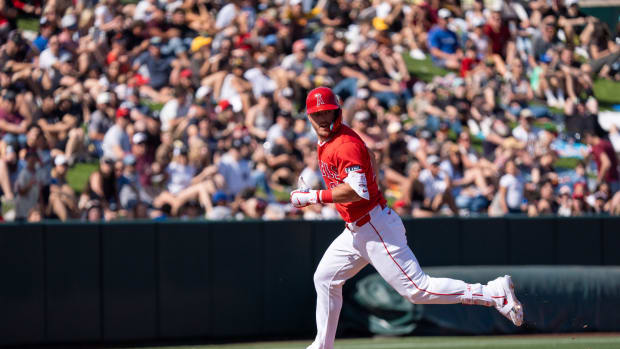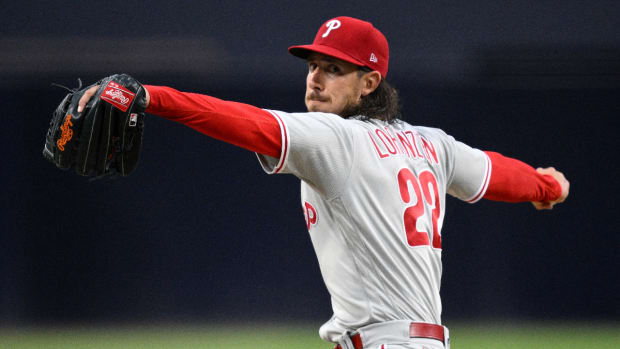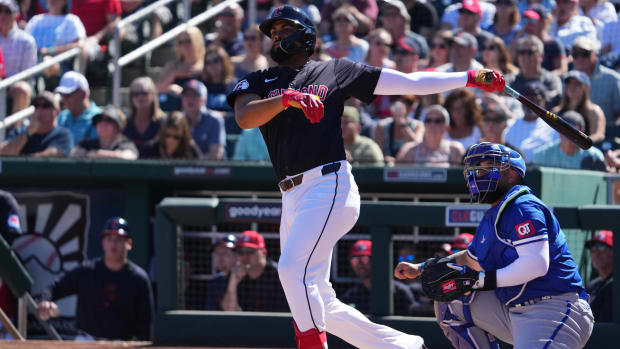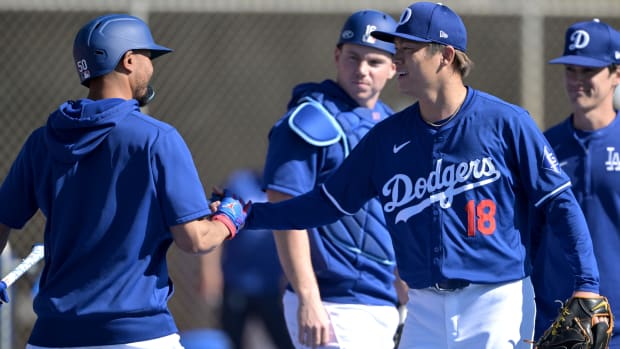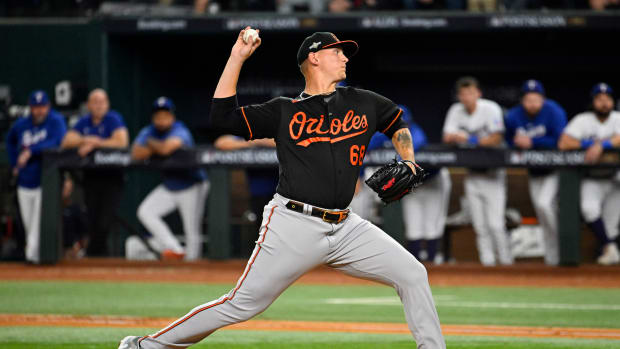With Yordano Ventura back from suspension, MLB execs sound off
Your teams. Your favorite writers. Wherever you want them. Personalize SI with our new App. Install on iOSor Android.
Baseball’s new leading villain was due to be released back onto the field on Tuesday night. He is Yordano Ventura, the Royals’ wispy 25-year-old starter who drilled Orioles’ star Manny Machado on June 7, inciting a bench-clearing brawl and earning himself an eight-game suspension. It was only the latest incidentin a sordid run of mound malfeasance for the 6’0”, 180-pound righthander, and it was clear that even his own teammates were growing weary of his act.
You could tell as much by the way that Salvador Perez, Kansas City’s normally protective catcher, half-heartedly trotted after an enraged Machado as he advanced, with a beating on his mind, on Ventura. Perez later claimed that the plunking took him by surprise, but that was hard to believe, as even Orioles manager Buck Showalter had warned Machado to expect one after Ventura had missed the slugger with two brushbacks in his previous at-bats that evening.
You could tell from Royals’ manager Ned Yost’s postgame quotes, in which he similarly declined to shield his pitcher. “There’s a little frustration when things like this happen, yeah,” Yost said.
And you could tell the next morning, when Yahoo!’s Jeff Passan reported that, according to league sources, Kansas City had been offering Ventura—who just two Octobers ago allowed two earned runs over 12 1/3 innings in the 2014 World Series—in trade talks.
In interviews with SI.com, though, player development executives and scouts expressed doubts that Ventura will be going anywhere anytime soon. What is truly important, for the Royals, is not where Ventura’s pitch to Machado ended up—in the small of his back—but the speed with which Ventura threw it: 99 miles per hour.
The idea of makeup—which refers to a player’s character, and essentially everything other than his physical skills—is important to the game’s evaluators. Make no mistake: they consider Ventura’s makeup, especially his immaturity and his temper, to be awful. To them, though, it is not nearly as bad as his stuff is great. “The stuff is just incredible,” says one rival scout. “Loose arm, looks like it’s made out of rubber.”
• Why Ventura has been a Royal pain for Kansas City
The secret about makeup is that for players who surpass a certain physical threshold, it almost never matters. Ventura might already be a former Royal, perhaps even a former major leaguer, if not for his magical right arm. “It’s unusual to have somebody who is this bad mentally and can last,” says one scouting director. “It takes a guy like him, who can throw 100, to be able to be like this. It’s very rare to have somebody with that sort of talent, but who is so aggressive in his personality and so emotionally out of control that it becomes a detriment. This guy might be in danger of crossing the line, but he’s not there yet.”
In fact, the evaluators with whom SI.com spoke had trouble conjuring a name of a player of Ventura’s level of talent whose poor makeup ultimately drove him out of the sport. “I’ll give you one,” says a scout, after some pondering. “Milton Bradley. This dude could have been so good, but he always had this volatile attitude, living on the edge, always angry at people. When you get into fights and nobody can talk to you and tell you anything, there’s a lot of selfishness there.”
Ventura’s troubles, however, have not begun to approach those of the former outfielder. Bradley was out of baseball at 33 having been passed around by no fewer than eight teams willing to give him a chance despite his history of disturbing on- and off-field incidents. In 2013, two years after his last game, Bradley was convicted on domestic violence charges.
• Subscribe to get the best of Sports Illustrated delivered right to your inbox
Baseball, of course, currently employs—and in many cases pays very well—many players who have used drugs, driven drunk, abused partners and committed a range of other offenses. Ventura’s misdeeds have been limited to the mound, and while his skills have kept him there, scouts wonder if his temper and intractability have harmed his results while on top of it. While his average fastball has barely diminished from his breakout rookie season in 2014—it was 96.0 mph then, and 95.7 now—his ERA has jumped from 3.60 as a rookie to 4.76 now, while his strikeout-to-walk rate has declined from 2.30 to 1.64. “There are some guys that don’t get it right away, and he doesn’t get it,” says a scout. “He’ll huff and puff and throw 99, and then he’ll get a mistake and get lit.”
“If you’re a gifted guy like he is,” adds a player development executive, “maybe you’re so stubborn that you’re not making the changes you need to, applying yourself, listening to your coaches. It’s gonna hinder you from reaching your ceiling.”
Still, the fact remains that Ventura is just 25, with a lightning arm and a track record of success, and he is also signed to a team-friendly contract. He is owed just $19.25 million over the next three seasons, through 2019, with a pair of $12 million club options thereafter. Despite the recent whispers, that sort of profile—combined with the market impact of his recent troubles—in reality makes him one of the most untradeable players in baseball. “The guy has No. 1-type stuff,” says a scout. “The bell’s gonna go off sooner or later. And you’d hate to be the team that gave up on it.”
• The 30: Where do Royals sit in Jonah Keri's latest Power Rankings?
The Royals, then, are likely stuck with him, and that might not at all be a bad thing. In the two games Ventura started while his suspension was still being adjudicated, he pitched 13 1/3 innings of one-run, 15-strikeout, one-walk ball, and emerged with two wins. Perhaps the Machado brawl served as a wake-up a call, the sparking of a delayed mental maturity.
Or perhaps it didn’t. Perhaps the next time Ventura feels even marginally aggrieved, he will bury a heater into a hitter’s ribs, risking the health of himself and his teammates in the aftermath. Even so, it likely won’t really matter, not as long as he continues to scrape 100 and as long as he continues to produce acceptable results. Baseball, after all, is a world in which the adjective “nasty” is almost always applied admiringly. It is also a world in which the difference between villain and antihero is about one and a half points of ERA.































